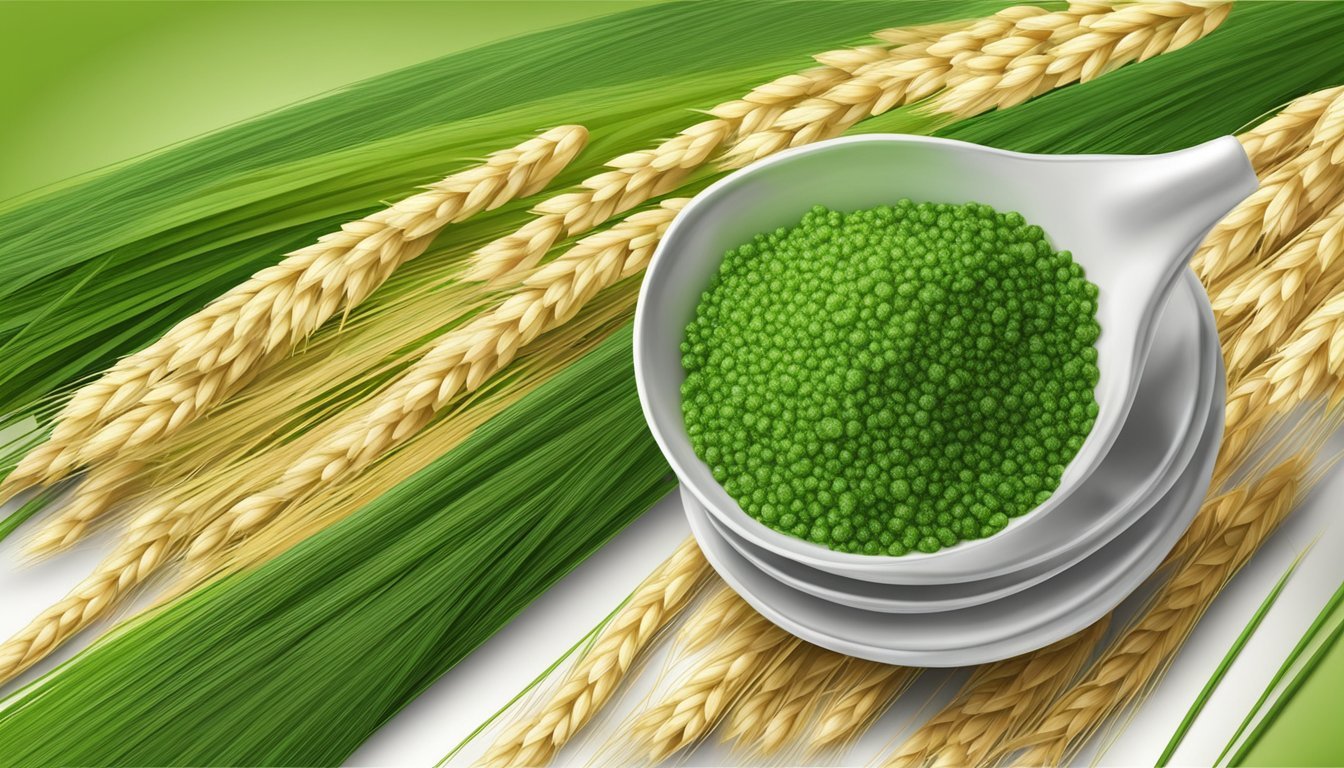Can Diabetics Eat Barley Grass?
Health Benefits and Considerations
Barley grass, derived from young barley plants, is being explored for its potential benefits for individuals with diabetes. Packed with essential nutrients and rich in fiber, barley grass may help regulate blood sugar levels, making it a fitting consideration for diabetic diets. Studies suggest that taking barley leaf extract can improve blood sugar control, thanks to its high levels of soluble fiber and other beneficial compounds.
With a nutrient profile that includes vitamins, minerals, and antioxidants, barley grass offers more than just blood sugar regulation. It supports overall health by potentially aiding in digestion, weight management, and lowering cholesterol levels, which are crucial aspects of diabetes management. Even though fresh barley grass might be hard to locate, barley grass powder provides an accessible alternative to incorporate into daily routines.
While promising, it's crucial for diabetics to monitor their carbohydrate intake and consult healthcare providers before making significant dietary changes. This balanced approach ensures they can harness the potential benefits of barley grass without compromising their overall dietary needs.
Understanding Diabetes
Diabetes is a chronic condition affecting the body's ability to manage blood glucose levels, often requiring lifestyle adjustments, particularly in diet, to effectively manage the disease.
Basics of Diabetes
Diabetes is characterized by high blood sugar levels due to issues with insulin production or use. Type 1 diabetes is an autoimmune condition where the body attacks insulin-producing cells. Type 2 diabetes involves resistance to insulin, often linked to lifestyle factors. Prediabetes is a precursor with elevated blood sugar levels but not high enough for a diabetes diagnosis.
This condition affects how the body processes carbohydrates, which can significantly impact blood glucose levels. A1C tests measure average blood glucose over three months, providing insight into diabetes management. Regular monitoring of blood glucose and maintaining healthy insulin levels are crucial for managing diabetes.
Importance of Diet in Diabetes Management
Proper diet is essential for diabetes management. Foods with a low glycemic index help stabilize blood sugar and insulin levels. High-fiber foods, like vegetables and whole grains, are beneficial as they slow glucose absorption, preventing spikes in blood glucose levels.
Carbohydrates are a key focus since they directly impact blood sugar. Type 2 diabetics should monitor their carb intake to avoid hyperglycemia. Additionally, maintaining a balanced diet helps manage A1C levels and reduces the risk of complications. Understanding how different foods affect blood glucose aids in effective diabetes management.
Barley Grass and Its Nutritional Profile
Barley grass is known for its strong nutritional benefits, offering a variety of essential vitamins, minerals, and fiber. Here, we explore its key nutrients, the importance of its fiber content, and its wealth of vitamins and minerals.
Key Nutrients in Barley Grass
Barley grass is packed with nutrients that provide significant health benefits. A notable amount of protein—about 2 grams per three teaspoons of barley grass juice powder—makes it a valuable addition for those needing more protein in their diet.
Each serving provides approximately 20 calories and zero grams of fat, making it a low-calorie option. Additionally, it includes essential elements like iron, magnesium, and antioxidants such as vitamin A and vitamin C, which help protect the body from free radicals.
The Role of Fiber
Fiber is a critical component of barley grass that aids in digestion and maintains healthy blood sugar levels. Dried barley grass contains nearly 3 grams of fiber per tablespoon, contributing to its effectiveness in controlling blood glucose.
The fiber in barley grass is particularly beneficial for diabetics as it helps reduce blood sugar spikes after meals. It contains soluble fiber and beta-glucan, which play a role in lowering cholesterol levels and improving heart health.
Vitamins and Minerals
Barley grass is a rich source of various vitamins and minerals essential for overall health. Vitamin A, present in substantial amounts, supports vision and immune function. Vitamin C is another potent antioxidant that aids in tissue repair and iron absorption.
The presence of niacin and vitamin E further underscores its nutritional value. Minerals like iron and magnesium facilitate the body's metabolic processes and contribute to the formation of red blood cells and energy production. These essential nutrients collectively enhance the body's functionality and resilience against diseases.
Health Benefits of Barley Grass
Barley grass offers numerous health benefits, particularly in managing blood sugar levels, improving cardiovascular health, and supporting a healthy digestive system.
Barley Grass and Blood Sugar Control
Barley grass is beneficial for those managing diabetes due to its ability to help control blood sugar levels. It increases insulin sensitivity, vital for diabetes patients. This means the body can use insulin more effectively to regulate blood glucose.
Clinical studies have shown that consuming barley grass can lead to a smaller rise in blood glucose post-meal. For instance, a group consuming barley cereal experienced a lesser increase in blood glucose compared to those consuming other foods. This makes barley grass a valuable addition to a diabetic-friendly diet.
Effects on Cholesterol and Cardiovascular Health
Barley grass also has positive effects on cholesterol and heart health. It helps in lowering cholesterol levels and can reduce the risk of cardiovascular diseases. In a study, daily consumption of barley grass led to a 5.1% decrease in cholesterol levels over 70 days.
Its antioxidant properties contribute to heart health by preventing inflammation and reducing oxidative stress. These benefits collectively support cardiovascular health and may decrease the risk of heart disease by managing blood pressure and reducing LDL cholesterol.
Digestive and Gut Health
Barley grass is rich in dietary fiber and acts as a prebiotic, promoting gut health. It supports the growth of good bacteria in the stomach, aiding in better digestion and reducing bloating. This fiber content also helps in maintaining a healthy appetite.
The prebiotic nature of barley grass improves the microbiome, which is essential for overall gut health. A healthy gut can prevent many chronic diseases and inflammation. This makes barley grass an excellent component of a balanced diet, contributing to better digestion and gut microbiome health.
Barley Grass in the Diabetic Diet
Barley grass is a beneficial addition to a diabetic diet due to its ability to manage blood sugar levels and provide essential nutrients. It can be easily incorporated into various meals, and its benefits can be compared to other grains commonly consumed by diabetics.
Incorporating Barley Grass
Barley grass can be consumed in several forms, such as powder or juice. It can be added to smoothies, salads, or other dishes to provide a nutritional boost. Rich in fiber, barley grass helps in regulating blood sugar levels and reducing insulin resistance.
One practical approach is combining barley grass powder with water to make barley water, which can be consumed throughout the day. This not only helps in hydration but also supports weight loss and hunger management due to its low glycemic index.
Comparison with Other Grains
Compared to refined grains like white rice, barley grass offers a lower glycemic load, which is crucial for diabetics. It is rich in nutrients like fiber, zinc, and copper, making it a healthier option than many refined grains.
When comparing barley grass with other whole grains like oatmeal or quinoa, barley grass stands out for its unique lipid-lowering properties and ability to improve fasting glucose levels. For those with celiac disease or gluten intolerance, it's important to note that barley grass is gluten-free, unlike barley flakes or bran, which contain gluten.
Potential Risks and Considerations
While barley grass is generally safe, there are considerations to be aware of. Those with gluten intolerance or allergies should ensure they are using gluten-free certified barley grass products to avoid adverse reactions.
Overconsumption might lead to digestive issues such as constipation, especially if not paired with adequate water intake. Moreover, individuals should monitor their blood pressure as barley grass can influence blood pressure levels, which could be a concern for some diabetics on medication.
To maximize benefits, it's advisable to start with small amounts and gradually increase the intake while monitoring blood sugar and overall health. Including a variety of other whole grains like bulgur wheat or rolled oats can also create a balanced diet.
Scientific Research and Studies
Numerous studies suggest that barley grass has health benefits, especially for managing diabetes. This section explores how barley grass impacts blood sugar control and its nutritional value.
Evidence on Barley Grass and Diabetes
Research indicates that barley grass may help in lowering blood sugar levels. Studies show that it contains various functional ingredients such as GABA, flavonoids, superoxide dismutase (SOD), potassium, calcium, and vitamins, which contribute to its antidiabetic effects.
A study focusing on type 2 diabetes mellitus (T2DM) highlighted that a diet enriched with whole grain barley improved insulin sensitivity and reduced blood sugar levels. Another research found that mice with diabetes experienced better glycemic control when fed barley-based diets.
Nutritional Comparisons and Meta-Analyses
Barley grass is rich in dietary fiber, which aids in regulating blood sugar levels by slowing the absorption of glucose. It contains beta-glucan, a soluble fiber known for reducing cholesterol and improving glycemic control.
Nutritional analyses reveal that barley grass has a high glycemic index (GI) but a low glycemic load (GL), making it suitable for diabetics. A systematic review summarized that integrating barley grass into the diet could meet WHO's daily intake target of low sodium and high potassium, essential for diabetes management.
Recent meta-analyses show that barley consumption is as effective as oats in lowering cholesterol, which is beneficial for cardiovascular health in diabetic patients. The comprehensive nutrient profile of barley grass, encompassing high fiber and essential vitamins and minerals, supports its inclusion in a diabetes-friendly diet.
Integrating Barley Grass with Lifestyle
Integrating barley grass into one's diet can support healthier blood sugar levels and overall well-being for diabetics. Understanding lifestyle factors and making informed consumption choices are key.
Lifestyle Factors Affecting Diabetics
Diabetics often need to manage multiple lifestyle factors for optimal health. Regular exercise can improve insulin sensitivity and aid in weight loss, reducing the burden on the body's metabolic system. Exercise also helps reduce inflammation, which is crucial for overall health.
A healthy diet, rich in fiber and low in refined sugars, supports blood glucose control. Barley grass fits well within this framework due to its high fiber content. Obesity management is essential, as excess weight can exacerbate diabetes symptoms. A diet including barley grass can promote satiety, aiding in weight management.
Recommendations for Consumption
Incorporate barley grass into smoothies, juices, or simply mixed with water. Diabetics should aim for consistency in their diet to maintain stable blood sugar levels. Using powdered barley grass supplements can be a convenient option.
It's important to monitor portion sizes and consult with healthcare providers. Moderation is key; while barley grass provides benefits, it should complement a diverse diet. Combining it with other nutritious foods can help maintain immunity and reduce the risk of over-reliance on any single food source.
Engaging in regular physical activity and maintaining a balanced diet are fundamental. Integrating barley grass into this routine can support a holistic approach to diabetes management, enhancing overall health and reducing risks.
Miscellaneous Concerns and Benefits
Barley grass offers a variety of health effects beyond diabetes management and may have some potential side effects. Knowing both can help individuals make well-informed decisions on incorporating barley grass into their diets.
Effects Beyond Diabetes
Barley grass boasts nutrients that contribute to various health benefits. It contains vitamin B6, which can support brain health and improve cognitive functions. The high fiber content promotes fullness, potentially aiding in weight management and reducing hunger by lowering the hormone ghrelin.
Some studies suggest that barley grass might help lower cholesterol levels and protect against heart disease. Antioxidants present in barley grass may also reduce the risk of cancer and combat chronic diseases. The inclusion of barley grass in diets might help improve digestion and prevent issues like gas.
Potential Side Effects of Barley Grass
While barley grass has numerous benefits, it may also cause some side effects. Some individuals might experience digestive issues such as gas and bloating after consumption. People with gluten sensitivity or celiac disease should be cautious, as barley contains gluten.
Though rare, excessive consumption of barley grass may lead to severe outcomes like nutrient imbalance or allergic reactions. It's essential to consume it in moderation and consult with a healthcare provider, especially for those with chronic conditions. Additionally, reliance solely on barley grass for nutritional needs without a balanced diet can have adverse effects on health.






